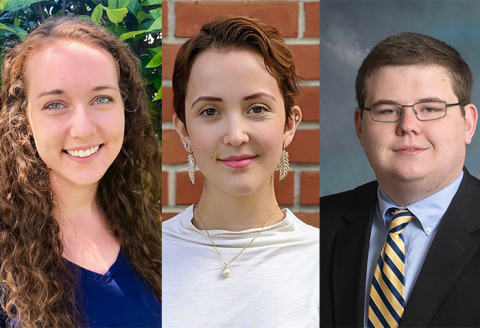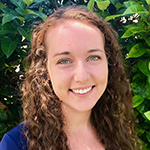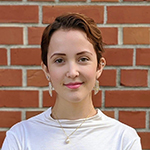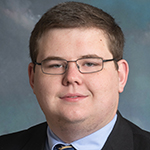Social Work Students Selected for 2020 Florida Area Health & Education Center Scholars Program

Three social work students, Olivia Hitchcock, Sofie Adele Muench and Brandon Rowland are among nine FSU students selected in disciplines across campus to be a part of the 2020 cohort of the Florida Area Health and Education Center (AHEC) Scholars Program. The students selected for the AHEC program will work directly with the Big Bend Area Health Education Center, gaining firsthand experience in underserved settings.
More than 400 FSU students applied for the two-year program that offers 80 hours of clinical and didactic training while receiving core fundamentals, including interprofessional education, behavioral health integration, social determinants of health, practice transformation and current/emerging health issues. “Our program complements and builds upon the student’s traditional health care curriculum and gives them a chance to work together as a team to problem solve prior to graduation,” said Allison Wiman, executive director of Big Bend AHEC.
AHEC’s mission is to enhance access to quality health care, particularly primary and preventative care. The organization also seeks to improve health care professionals’ supply and distribution via strategic partnerships with academic programs, communities and professional organizations. These efforts support strategic priorities to increase representation among healthcare professionals and enhance healthcare quality and delivery to rural and underserved areas. “When health care providers work as a team, patients receive better care,” said Kristen Aguirre, scholar coordinator for AHEC. “We expect great things from this selection of dynamic scholars.”

Olivia Hitchcock
Prior to starting her dual degree program in social work and criminology/criminal justice, Olivia Hitchcock spent more than four years at a South Florida newspaper as a crime reporter. This particular focus led Olivia to want to learn more about this field that went beyond sharing stories and delved into ways to affect the lives of people affected by the criminal justice system. “The need was evident – victims’ families often came to me with questions regarding court proceedings, victim compensation funds, and basic social services,” recalls Olivia. “Often I didn’t know the answers to their questions. By going back to school, I hope to be better equipped to respond.”
Within weeks of starting her program she saw how important it is to better understand clients’ needs, including their health needs, and how to direct them to the right resources. When she saw an email about the AHEC program, she jumped at the opportunity.
“For me, the greatest appeal of the AHEC Scholars program is its interdisciplinary nature,” said Olivia. “I now have the opportunity to work with and learn from students in vastly different fields from my own. As someone aspiring to work in the highly collaborative field of social work, this program offers me the opportunity to begin those partnerships early.”
Olivia is also currently working as a research technician with the FSU Institute for Justice Research and Development at the FSU College of Social Work with their data team. Her primary role consists of assisting with the institute’s 5-Key Model for Reentry research project. The project evaluates the effectiveness of the model developed by a group of researchers, including incarcerated individuals and practitioners, and centers on individuals’ overall well-being.
After graduation, she intends to continue working in the criminal justice field, with the aspiration to be involved in reentry work with formerly incarcerated individuals and their families.

Sofie Muench
“Being diagnosed with epilepsy at the age of eight, as well as facing learning disabilities, I often had trouble with my self-image, felt overwhelmed, insecure, and frustrated with school material,” said Sofie Muench. “Having the opportunity to meet with caring and sympathetic therapists allowed me to begin believing in myself.”
Sofie’s earlier experience inspired her to help others as she witnessed first-hand the dedication and passion from her own therapist. “Since experiencing the revolutionary aid a social worker can provide to society, I dedicated myself in activities that serve members of my community,” she added. At sixteen, she started her own tutoring service for children with attention deficit disorder and for students for whom English was a second language. She received a bachelor’s degree in sociology from the University of Florida with a minor in behavioral analysis.
Now, Sofie is enrolled in her MSW program at the FSU College of Social Work and is eager to begin working with the AHEC program because of its focus on community-based learning and students’ preparation in multiple disciplines to work with underserved communities. “I am eager to have the opportunity to participate in community-based field placements as well as work with an interdisciplinary team,” she said. “Programs like AHEC are crucial for health professional students to gain the ability to interact, learn and problem solve with scholars from different disciplines.”
She is currently interested in working with children and adolescents with mental health challenges but is open to new experiences. Sofie also aspires to be a licensed clinical social worker after graduation to provide mental health services to low-income communities as well as to establish her own private practice one day.

Brandon Rowland
Growing up in Waycross, Georgia in a rural community, Brandon Rowland observed firsthand the needs and challenges of rural communities to gain access to resources. He knew he wanted to focus his education and career on doing his part to assist people in areas like the one he grew up in.
He completed a double major in psychology and sociology in Georgia Southern University and decided to pursue a graduate that complements the unique clinical experience and sociological perspective he learned in his undergraduate programs. He was again drawn to a dual degree program at Florida State University in social work and public administration (MSW/MPA) that would give him the balance of advancing his clinical skills, working in public services and helping people gain access to resources.
When Brandon Rowland heard about the AHEC program it seemed like a perfect complement to his interests. He was particularly intrigued about the training for clinicians to better serve rural areas. “I chose to apply to the AHEC program because there is an overwhelming shortage of medical and mental health professionals in rural southeast Georgia and other rural areas across the country,” he explained. “Through this program, I hope to learn new interdisciplinary skills and make professional connections that will allow me to bring quality care to rural communities like my hometown.”
Brandon currently enjoys most working with children and adolescents, a population vulnerable to developing mental health issues and being victims of violence. After graduating, he plans to complete his education with a law degree, helping clients navigate the legal challenges that come with mental health and other health challenges.
